GOOD BOOKS IN BAD TIMES
Richard Shereikis is professor emeritus
of English at what is now the University of
Illinois at Springfield. He spends his
summers on an island in Wisconsin and his
winters in Evanston. He contributes reviews
and essays to such publications as Illinois
Issues and Illinois Times.
If there's a future for real books, it's
in places like Champaign, Carbondale and DeKalb
Essay by Richard Shereikis
"We read to understand, or to begin to understand.
We cannot do but read. Reading, almost as much
as breathing, is our essential function."
— Alberto Manguel, A History of Readin
To steal a notion from Charles
Dickens, you might say these are the
best of times and the worst of times
in the American book publishing
business.
If you're a bottom-line type, you
could look at the record-breaking $20
billion in U.S. book sales last year and
argue that things can't get much better.
With huge book superstores drawing
hordes of browsers and cappuccino
sippers to shelves and tables blooming
with books, you might assume we've
really become a nation of readers. But
a look behind the glittery facade
reveals another truth.
To serious readers and writers,
these are the worst of times, in which
celebrity "authors" (think Dick
Morris, O.J., and Paula Barbieri, for
openers) get millions for books they
may not have read, let alone written;
and where juggernaut book chains
like Borders and Barnes and Noble
steamroll their competition and drive
out good books with bad, discounting
stacks of schlock (tables full of
Princess Di bios, for example), while
letting provocative works of serious
authors languish for lack of
promotion.
This is "the dark heart of the [publishing] empire," as an editorial in a
special issue of The Nation called it
last spring. But while the bulk of that
issue explored the deplorable state of
America's book business, the editors
saw a ray of hope in operations like
university presses, where "literate
people produce books rich with meaning, motivated by an old-fashioned
love of art and ideas."
If there's any future for real books in
America, then, it lies outside the major
publishing houses, which are now just
tiny specks on the landscapes of huge
conglomerates like Time-Warner,
Viacom and Rupert Murdoch's News
Corp.
Given the values of that sordid
world, lovers of "old-fashioned art
and ideas" will have to look for sustenance in less glitzy places, like Champaign, Carbondale and DeKalb, where
Illinois' three public university presses
perform the traditional roles of higher
education. At a time when universities
have abrogated much of that responsibility, evolving into something akin to
trade schools or spas, the presses' productions provide generous benefits for
modest investments: They enrich our
culture and advance the frontiers of
knowledge, serving as a stay against
banal commercialism.
You won't find their products on
national best-seller lists, or featured on
Oprah's Book Club, but you will find
their book lists deep and lively, full of
solid scholarship, quirky surprises and
more food for thought than you'll see
down at your local superstore on 10
tables full of commercial pabulum
about cats, dogs, thighs, abs and
mutual funds.
Among the University of Illinois
Press' fall-winter offerings, for example, you'll find scores of books on
subjects ranging from advertising to
women's studies. Depending on where
you open the 40-page catalog, you
might think the press specializes in
studies of Abraham Lincoln, or labor
history, or country music, or sports, or
film, or literary studies, or astronomy,
or contemporary poetry. But even that
varied list doesn't capture the range of
the press' offerings, which evolved
from humble beginnings in 1918 when
a few faculty monographs were
published more or less informally.
Richard Wentworth, the press' director since 1979, credits his predecessor,
Miodrag Muntyan, with turning the
operation at Urbana-Champaign into
a "coherent, major publisher of scholarly books" sometime in the 1940s.
Publications in the New Math were
popular early, and, in the 1960s, the
press had a major financial success
14/ December 1997 Illinois Issues
with the Illinois Test of Psycholinguistic Abilities, which tested children
under the third grade on their reading
abilities.
At a time when the press' annual
budget was something like $ 1.1 million, the $650,000 brought in by the
Illinois Test provided a sound financial
basis, which enabled the U of I to publish works it thought important but
unlikely to generate much income.
And that's precisely the challenge for
all university presses, according to
Wentworth, in a business where the
mission is to extend the frontiers of
knowledge, not swell corporate coffers.
"We're usually trying to market books
it's impossible to break even on,"
Wentworth says. "But you try to develop some that will sell enough to make
up for the valuable scholarly ones that
won't find a wide audience."
Over the years, the press' full-time
staff has grown to 35, with an annual
budget in the neighborhood of $4 million, around 17 percent of which
comes from the university, according
to Wentworth. (That subsidy is fairly
standard for other public university
presses.) The rest comes from sales,
and from efforts to attract other support. Some of the press' budget comes
from grants or donations from foundations that support specific books or
series, like the Prairie State Books,
reprints of classic regional works.
Some funds come from individuals, as
in the case of a $25,000 gift from a
graduate of the university's history
department to support historical
studies. Occasionally, the home university of an author will lend support to a
specific project, to advance a work it
deems important.
Or a university press can reap the
benefits of finding a surprise bestseller, as the U of I did in 1978 when it
obtained the distribution rights to
Zora Neale Hurston's Their Eyes Were
Watching God, first published in 1937.
Catching the wave of interest in
women's studies and African-American literature, Hurston's work sold
38,000 copies in 1985 and has gone on
to sell tens of thousands more, giving
the press the means to publish other
works that may not recoup their
production costs.
"Normally our books will break
even if we can sell 2,000 copies," says
Wentworth, "and we're happy when we
get a solid seller like [Irving Cutler's]
The Jews of Chicago, which has sold
around 5,000 copies."
Even those numbers would cause
contempt in commercial publishing
houses, of course, with steely accountants looking at the billing sheets. But
that's all the more reason to value
efforts like the U of I's labor history
series, for example, which was recently
enhanced by Rick Halpern's Down on
the Killing Floor: Black and White
Workers in Chicago's Packinghouses,
1904-54, which combines traditional
scholarship with oral history to tell a
compelling story about race relations
and American labor history. And without the U of I Press, there would be no
recognition for the fine poets who are
given voices in an ongoing series, some
volumes of which are published in
conjunction with a national program
to identify and cultivate deserving new
talent.
Like its older counterpart in
Urbana-Champaign, the Southern
Illinois University Press in Carbondale
grew from modest beginnings. When
it started officially in 1956, it was
essentially a one-man operation, with
Vernon Sternberg, who had journeyed
to Little Egypt from the University of
Wisconsin, taking on most of the
press' responsibilities: acquiring manuscripts, editing, marketing and shipping books. In its first six months, the
SIU Press had an income of $361, with
an inventory that could be stored in a
single room in the library.
From that beginning, the SIU Press
has grown to its current state with a
12,000-square-foot warehouse, a backlist of more than 1,000 titles, a fulltime staff of 23 and an annual budget
of around $1.3 million. The current
director is John F. Stetter, who came to
SIU from Texas A & M in 1993 with a
strong commitment to the traditions
established by Sternberg and his
successor, Kenny Withers.
One such tradition lies in the area of
rhetoric and composition, in which
SIU books have won awards from the
Modern Language Association, the
Conference on College Composition
and Communication, and the Association of Teachers of Advanced Composition. Another is the unofficial series
of books by and about Frank Lloyd
Wright, some of which have gone
through multiple printings, providing
a financial cushion for other press
endeavors. And for a number of years,
the press has published well-received
work on the film industry, including
Films of the Eighties, which Choice
magazine selected as one of its Outstanding Academic Books in 1993.
Among SlU's more ambitious scholarly projects is its 37-volume Collected
Works of John Dewey, started in 1961
under the supervision of Jo Ann
Boydston, a series which has earned
scholarly approval from the Modern
Language Association. The Papers of
Ulysses S. Grant, edited by John Y.
Simon, are also published by the SIU
Press. That project had reached 20
volumes by 1995.
But Sternberg's legacy and Stetter's
interests range beyond even these
substantial achievements. A series on
Scandinavian studies, several books on
the rights of special populations
supported by the American Civil
Liberties Union, books of literary
criticism and a projected series called
Writing Baseball fall within SlU's
compass, along with a number of
regional books that have been part of
the press' offerings for years.
"We've made a strong commitment
to our region," says Stetter, "which we
feel extends throughout the state and
across our neighboring states' lines.
We'll be publishing a book about Dan
Rostenkowski by a Chicago journalist
[Illinois Issues contributor James L.
Merriner], for example, and we intend
to continue our Shawnee Classics
series," which includes such titles as
Black Jack: John A. Logon and Southern Illinois in the Civil War Era and
The Outlaws of Cave-in-Rock, billed as
a "riveting saga of scoundrels and
rogues, an audacious cast of river
pirates and highwaymen who operated
in and around the famous Ohio River
cavern from 1795 through 1820."
The varied fare of SIU suggests why
university presses are crucial in a book
world dominated by corporate values.
Illinois Issues December 1997 /15
A publishing house in a large conglomerate wouldn't be allowed to risk
the publication of a philosopher's
collected works, or even the papers of
a crucial figure like Grant, let alone a
look at a quirky bunch of 19th century
bandits. But that variety, and the challenge of adding to our understanding
of ourselves and our culture, is what
makes John Stetter love his work. "If
you can't have fun in a job like this," he
says, "you're probably brain dead." He
goes on to talk about his hopes for the
baseball series, a project proposed by
Richard Peterson, a longtime professor of English at SIU.
|
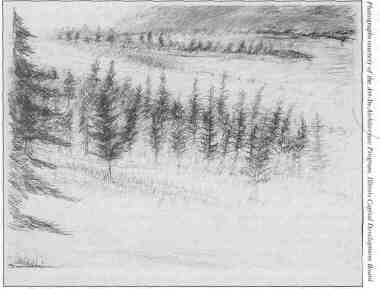
Fred Jones, Macomb
Winter Triptych, 91
1991
|
Like her downstate counterparts, Mary Lincoln, director of the
Northern Illinois University Press in
DeKalb, faces major challenges in a
volatile, commercial book world that
produces best-seller lists contaminated by the works of comedians (Drew
Carey, Whoopi Goldberg and Paul
Reiser, currently), the banalities of
the latest self-help gurus, and soggy,
formulaic novels. It's a world, too, in
which academic libraries have con
spired to damage publishers, reducing book budgets in order to spend
more on computers and other
technological gadgets designed with
built-in obsolescence.
Even so, Lincoln remains optimistic
about the future of her business.
"Actually, this is a good time for university presses," she says, "although we
have to develop a broader educational
mission. We've always been strongest
in literature and history here, and we
mean to continue that tradition, along
with our emphasis on regional studies.
But we're looking for books that might
have appeal beyond the scholarly community, like one we have in production
now by David Young, a journalist, on
the history of public transportation in
Chicago."
|
Young's book would complement
others related to the city, like Roger
Biles' Richard J. Daley: Politics, Race,
and the Governing of Chicago, and
Paul Kleppner's widely praised, solidselling Chicago Divided: The Making
of a Black Mayor, an examination of
Harold Washington's career. And it
would relate thematically to NlU's
Railroads in America series, which
includes histories of specific railroad
lines (The North Western and The
Corn Belt Route, to cite two) and a
number of anthologies on railroad
work and travel.
Not that NIU has abandoned more
specialized academic works, which
are evaluated by outside reviews, a
practice common at all three public
universities. Its fall 1997 list includes
Elisa Kimerling Wirtschafter's Social
Identity in Imperial Russia, along with
a half dozen other, earlier titles in the
press' Russian Studies series, which
has been reviewed favorably in The
New York Times Book Review. A
strong backlist of books in anthropology is enhanced by Elizabeth
Fuller Collins' Pierced by Murugan's
Lance: Ritual, Power, and Moral
Redemption among Malaysian Hindus,
the kind of traditional scholarly
study that will find a small audience,
but might have implications beyond
its immediate subject.
NlU's budget is about $750,000 a
year, with a full-time staff of eight.
The press has about 260 titles stored
16/ December 1997 Illinois Issues
throughout the campus in basements
and central stores. Lincoln estimates
the total number of volumes in the
tens of thousands.
Lincoln's optimism about the
prospects for NIU and the other university presses is tempered by her concern about the role of market forces in
the publishing business. "It's hard to
get exposure in the Borders and other
superstores," she says, "when they're
interested in big best sellers and they
have policies that make it hard for us
to work with them."
|
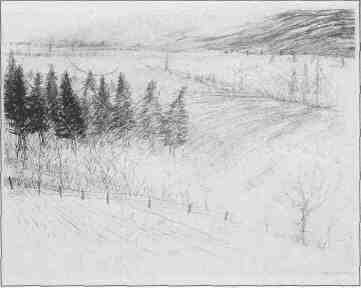
|
Major chains have been threatening
to charge between 1 percent and
3 percent of the invoice price for each
book returned, which would hamper
smaller presses' ability to give their
books exposure. But Lincoln hopes
that more aggressive marketing will
help university presses maintain a
presence in the superstores while they
continue to get exposure through
catalogs and the dwindling number of
independent book sellers — mostly in
urban areas near universities — which
are still interested in modest profits
for responsible work.
And, like Stetter and Wentworth,
Lincoln sees a silver lining in recent
developments among cutthroat commercial publishers. Last summer, for
example, HarperCollins shocked the
book business with its announcement
that it was canceling contracts on 106
titles. The company's claim, in most
cases, was that the authors had missed
deadlines, which, in the book business
is more the norm than the exception.
Like other publishers who had done it
less dramatically, HarperCollins had
rid itself of obligations to books that
it had decided wouldn't be profitable,
regardless of their merit or potential
significance.
|
Many of those authors went scrambling to find new homes for their manuscripts, and university presses may
become beneficiaries. "We normally
get around 300 manuscripts a year,
and we publish about 20 titles," says
Lincoln. "But we've seen signs that
that number may rise, and we've
already received at least one submission that we believe was among the
HarperCollins cancellations."
The future for university presses
may be brightening, in other words,
despite the smothering effects of
shrinking library book budgets,
schlock-dominated superstores and
commercial publishers who only want
blockbusters. If serious writers want
to tell their stories, argue their cases or
remind us of our past, they'll have to
look farther afield, to publishers for
whom "old fashioned art and ideas"
are still important.
And readers like Alberto Manguel
will have to look a little deeper to find
books that will sustain them. If, as
Manguel puts it, reading is akin to
breathing, the most bracing air for real
book lovers may be coming from independent and university presses, in
places like Champaign, Carbondale
and DeKalb.
Illinois Issues December 1997 /17
Where words really matter:
Illinois' independent presses
Curtis Johnson has been called
the "granddaddy of the underground literary movement" and
"almost the last of the angry
men/angry writers of conscience in
America."
|
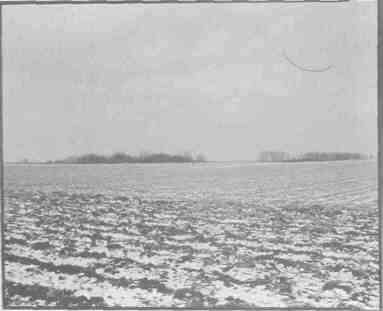
Rhondal McKinney, Normal
#1322 from the series "Illinois Farm Families"
|
He's fiercely independent, a novelist, short story writer and essayist
who has fought for nearly 40 years
to keep alive the flame of independent publishing. When the founding
editor of December gave the magazine to Johnson in 1958, it had 17
subscribers. By the time December
ended its run in 1981, it had given
voice to such young writers as Joyce
Carol Oates and Raymond Carver,
and Curt Johnson was only losing a
couple thousand dollars a year on it.
But Johnson sustained the spirit
of December in the press of that
name, which he still runs out of his
Highland Park home. He has published some of his own works
through the press, and some of
those have been picked up for distribution by bigger publishers. His
recent Wicked City — Chicago:
From Kenna to Capone, which has
earned favorable reviews in mainstream publications, will be distributed by the Da Capo Press out of
New York, which gives Johnson
hope that he'll see some financial
returns for his effort.
|
Johnson is too seasoned, though,
to believe that current conditions in
American publishing give any
grounds for optimism. "Things are
exponentially worse now than they
were even a few years ago," he says.
"Let me tell you a horror story. I
had Wicked City finished about five
years ago, and I gave the manuscript
to an agent. He liked it, and he
shopped it around, got it to a
reviewer who liked it too. And then
he asked me for a prospectus! I said,
'What the hell do you need a
prospectus for? You've got the whole
book.' And he said they didn't want
to bother reading the whole book.
Can you imagine? A publisher not
wanting to read a manuscript?"
Which is when Johnson decided to
publish Wicked City himself. And
why he tries to help other writers
who, he believes, deserve to be read.
He's published novels like Jerry
Bumpus' Anaconda, "about a drunk
in southern Illinois," according to
Johnson, and The Second Novel by
Norbert Blei, a prolific essayist and
fiction writer from the Chicago area
18/ December 1997 Illinois Issues
who is now the scourge of developers and other predators in Door
County, Wis.
Johnson's feisty independence is
the sort that makes the universe of
small, literary presses lively and
interesting. There are at least 100
such operations in Illinois right now
— it's hard to track the number
exactly — and their names alone
suggest their range and variety:
There's Black Ice Books in Normal;
Stormline Press out of Urbana; the
Thorntree Press in suburban Winnetka;
Tia Chucha Press in the heart
of Chicago; the Black Dirt Press,
which you can contact c/o Midwest
Farmer's Market at Elgin Community College; and the Third World
Press on Chicago's South Side.
|
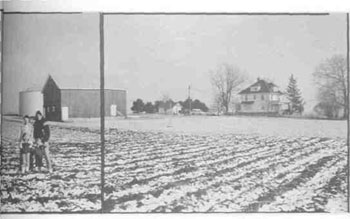
|
Together these small, often precarious operations give voices to writers
who have things to say about our
lives, our histories, our neighbors
who may be different from us. And
they usually do it as labors of love,
because it's a tough business competing with corporate publishing
houses that dominate displays at
your local Borders or Barnes and
Noble.
Ray Bial, who operates the
Stormline Press out of Urbana, is
one of those who gets satisfaction, if
not profits, from helping deserving
works get into print.
"What you see coming out of the
big commercial publishers today
isn't worth the paper it's written
on," says Bial, who works full-time
as a librarian at Parkland Community College in Champaign. "It's
just tabloid journalism in book covers: O.J. books and things like that.
They [the commercial publishers]
don't care about the culture of
books, about any kind of social
community."
|
So in 1985, Bial made an effort to
enrich the culture of books. He's
published The Alligator Inventions,
poems about his Cajun heritage by
Dan Guillory, an English professor
at Millikin University in Decatur;
and First Frost, poems about rural
life by Kathryn Kerr, both of which
have received warm reviews. Stormline's most recent title is Guillory's
When the Waters Recede, an account
of the Great Flood of 1993 and its
impact on four river towns that suffered from it.
"Getting books reviewed in
national publications is a key to getting any kind of sales," says Bial.
"We have an arrangement with Iowa
State Press, which distributes a few
of our titles, and we have a mailing
list which helps some. But getting
review copies to library journals and
places like that is the most important thing a small press can do to
generate interest and get some
orders."
Like most small publishers, Bial
isn't able to give his writers advances
Illinois Issues December 1997 /19
or high payments, but he does try to
help them realize some income from
their work. "We either give them 15
percent of whatever we bring in over
the cost of printing the book, which
means we have to sell about 1,000 to
1,200 copies," says Bial. "Or we just
let them have copies, which they can
take to readings and conferences
and sell on their own."
|
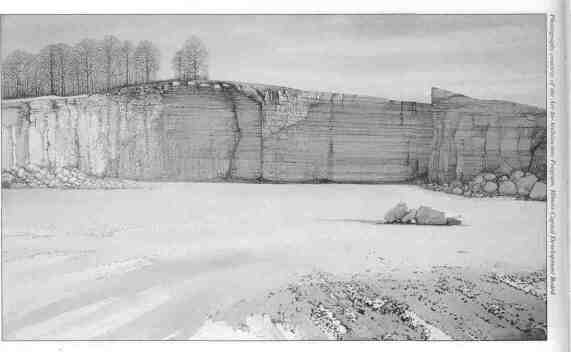
Kevin Booton, Springfield
Florence Quarry
1990
|
Either way, no one makes a living
from operations like Stormline.
"Now that the big publishers look
mostly for the entertainment angle,"
says Bial, "there's no market for the
old mid-list authors [like the Carvers
and Oateses]. University presses are
doing some really good scholarly
books, and they are moving into
things for more general readers. But
there's still room for good things
from small publishers, and it's great
to have an opportunity to help
writers find readers."
|
For the most part, Illinois' small
publishers operate in a Darwinian
world, in which they survive or
expire based on their sales alone.
But the Illinois Arts Council has
helped more than one such publisher develop a project or sustain
the operation. Rich Gage, who monitors the IAC's literary projects,
believes that small presses in Illinois
are "stronger than ever now,"
despite — or maybe because of —
the pressures from commercial publishers. Publishers like the Dalkey
Archive Press in Normal, and Tri-Quarterly, which has blended with
the Northwestern University Press,
are publishing serious fiction and
nonfiction. Three or four years ago,
a Dalkey book was nominated for
the National Book Award. And a
publisher like the Tia Chucha Press,
which is the publishing arm of the
Guild Complex in Chicago, a kind
of literary arts center, has done
about 20 volumes of poetry, mostly
by persons of color.
The IAC has helped these activities, with substantial grants to
Dalkey and Tia Chucha in recent
years, and with awards to various
literary organizations last year totaling more than $140,000.
Given the barren soil of the mainstream American book business, the
world of independent publishers
may be the only place where any literary flowers can bloom. While
Rupert Murdoch's and Ted Turner's
people are screening prospectuses,
people like Ray Bial and Curtis
Johnson will be reading actual manuscripts, looking for honest talent.
And when the next Carver or Oates
emerges, you can bet it will be from
the fertile soil of small publishers,
where literate people still have
respect for art and ideas.
Richard Shereikis
20/ December 1997 Illinois Issues




